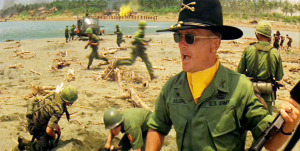Len Gutman's Blog, page 13
August 15, 2013
AFI #22: Some Like it Hot
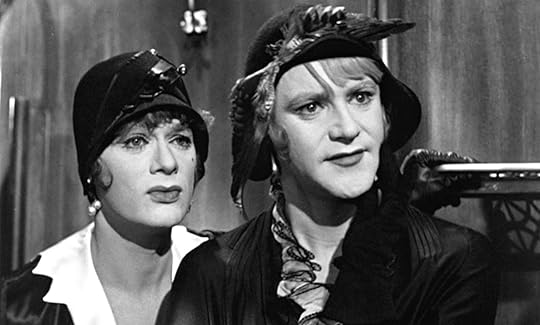 At No. 22 on the AFI top 100, Some Like it Hot is the highest ranking comedy on the list. This means a couple of things. One, I should not expect to laugh as I complete the remaining 21 films on the list. Two, the sense of humor of the AFI voters leaves something to be desired. This film is the classic case of a film that has a funny premise but does not deliver on the promise. Sure, it’s funny to see Jack Lemmon and Tony Curtis dressed like women. Yes, Marilyn Monroe plays her ditzy blonde for a few laughs. And sure, the funniest line in the film is saved for the end as goofy Osgood Fielding delivers a deadpan “nobody’s perfect” upon finding out that the “woman” of his dreams is in fact a man in drag. But over all the film isn’t that funny. In fact, it’s rather ridiculous.
At No. 22 on the AFI top 100, Some Like it Hot is the highest ranking comedy on the list. This means a couple of things. One, I should not expect to laugh as I complete the remaining 21 films on the list. Two, the sense of humor of the AFI voters leaves something to be desired. This film is the classic case of a film that has a funny premise but does not deliver on the promise. Sure, it’s funny to see Jack Lemmon and Tony Curtis dressed like women. Yes, Marilyn Monroe plays her ditzy blonde for a few laughs. And sure, the funniest line in the film is saved for the end as goofy Osgood Fielding delivers a deadpan “nobody’s perfect” upon finding out that the “woman” of his dreams is in fact a man in drag. But over all the film isn’t that funny. In fact, it’s rather ridiculous.
In 2000 the AFI put out its list of the 100 funniest films of all time and Some Like it Hot was number one. But just a quick look through the top 10 provides nine films that are much funnier than Some Like It Hot, including the likes of Tootsie, MASH, Annie Hall, Dr. Strangelove, Airplane, Blazing Saddles and Duck Soup to name a few. Some Like it Hot would barely crack the top 100 of my list. I’d say the AFI has a blind spot for modern comedies, but their top 100 included newer films like Groundhog Day, Big, Diner, Bull Durham and Caddyshack. All, by the way, much funnier than Some Like it Hot.
Look, don’t get me wrong. It’s a nice little film with some great performances by Lemmon and Curtis — especially Lemmon who was nominated for an Oscar. But it’s just not that funny. You want funny? Watch American Pie, The Wedding Crashers or Borat!
Next: Chinatown
Filed under: AFI Top 100, Film


August 9, 2013
AFI #23: The Grapes of Wrath
“Wherever there’s a fight, so hungry people can eat, I’ll be there. Wherever there’s a cop beatin’ up a guy, I’ll be there. I’ll be in the way guys yell when they’re mad. I’ll be in the way kids laugh when they’re hungry and they know supper’s ready, and when the people are eatin’ the stuff they raise and livin’ in the houses they build – I’ll be there, too.”
It’s really not fair for me to rate The Grapes of Wrath as a film considering John Steinbeck is one of my favorite writers and the novel is an American classic. Director John Ford never had a chance articulating this incredible novel in a two hour movie. The novel has so much depth and so many layers that the film couldn’t touch, and of course the film barely scratches the surface of those themes. The novel, of course, ends in shocking fashion with Rose of Sharon feeding a starving man from her breast and Ford was just not going to touch that with a ten foot pole in 1940. Additionally, former pastor Casy is a key character in the novel and he hardly plays a part in the film. Casy is the spiritual center of the novel and it is he who provides Tom Joad with inspiration to fight for justice. That said, I guess I’ll say a few good things about the film.
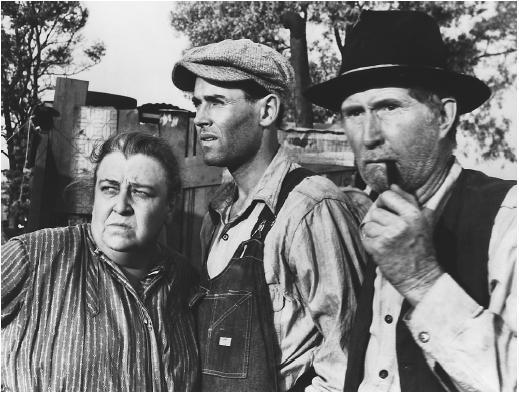 The film was made not long after the fictional events of the Joad family would have taken place, and given that it was pretty bold of Ford to adapt Steinbeck’s novel for mass audiences. The dust bowl and depression was an horrific time in American history and one of the most important aspects of art is that it can provide people with a way to look at their own situations and the situations of those around them. For that reason the film is important and even though it doesn’t do the novel justice it still does a good job portraying life for the folks who were run off their land during the dust bowl and the difficulties they found out West.
The film was made not long after the fictional events of the Joad family would have taken place, and given that it was pretty bold of Ford to adapt Steinbeck’s novel for mass audiences. The dust bowl and depression was an horrific time in American history and one of the most important aspects of art is that it can provide people with a way to look at their own situations and the situations of those around them. For that reason the film is important and even though it doesn’t do the novel justice it still does a good job portraying life for the folks who were run off their land during the dust bowl and the difficulties they found out West.
Beyond the story there are some great acting performances, most especially that of Henry Fonda who was nominated for a Best Actor Oscar but lost to James Stewart for The Philadelphia Story and for the record that is one of my favorite films and it is by far Stewart’s best performance so I’m not going to complain about Fonda losing. Jane Darwell actually did win an Oscar for playing Ma Joad and she was definitely a highlight in the film. She keeps the family together through difficult times and Darwell is terrific. She is a great actress who also had key roles in Gone With the Wind and Mary Poppins to name a couple.
Lastly the great John Carradine played Casy, and while he wasn’t in the film much he was great when he was on screen. In fact, I’ll leave you with my favorite line from the film…uttered by the fallen pastor Casy. It’s a line directly from the novel and one that scholars use to help answer the question of whether Steinbeck was an atheist or not. I suggest he was, as evidenced by this quote from Casy, along with similar anti-religious lines in a variety of his novels:
“Maybe there ain’t no sin and there ain’t no virtue, they’s just what people does. Some things folks do is nice and some ain’t so nice, and that’s all any man’s got a right to say.”
Next up: Some Like it Hot
Filed under: AFI Top 100, Film


July 29, 2013
AFI #24: E.T. the Extra-Terrestrial
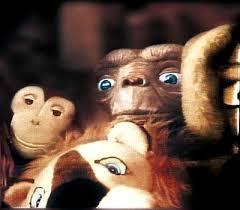 When it comes to sappy science fiction Steven Spielberg opened and closed the book in 1982 with E.T. the Extra-Terrestrial, the story of a California family that takes in a friendly alien who was accidentally left behind by his space travelling partners from some unknown planet. Released just three years after Sigourney Weaver battled a terrifying space monster in Ridley Scott’s Alien, E.T. is the Casper the Friendly Ghost of science fiction. I was 16 year’s old when E.T. came out and I remember thinking it was sappy back then and watching it again this weekend did nothing to change my mind. Don’t get me wrong — it’s a cute film and that darn E.T. was so adorable (E.T. phone home!), but in terms of the best films in American history I can’t agree with the AFI here.
When it comes to sappy science fiction Steven Spielberg opened and closed the book in 1982 with E.T. the Extra-Terrestrial, the story of a California family that takes in a friendly alien who was accidentally left behind by his space travelling partners from some unknown planet. Released just three years after Sigourney Weaver battled a terrifying space monster in Ridley Scott’s Alien, E.T. is the Casper the Friendly Ghost of science fiction. I was 16 year’s old when E.T. came out and I remember thinking it was sappy back then and watching it again this weekend did nothing to change my mind. Don’t get me wrong — it’s a cute film and that darn E.T. was so adorable (E.T. phone home!), but in terms of the best films in American history I can’t agree with the AFI here.
The film is ridiculously cliche and you know what’s going to happen all along. I’m not going to tear it apart — it is indeed iconic, but you know what I’m getting at. To say it’s predictable is an understatement. So how about some nice moments for posterity? The scene where E.T. hides in the closet among Elliott’s stuffed animals so the mom won’t see him is terrific. As is the scene where E.T. gets drunk on Coors and topples over in the family’s kitchen. And then there’s the adorable scene where young Gertie (Drew Barrymore) dresses E.T. up as a woman. And of course who could forget the scene where Elliott flies off into the moonlight with E.T. in a basket on his handlebars. Yes, iconic moments all.
I’m not sure what Spielberg was going for here. His Close Encounters five years earlier was a much better alien movie, but perhaps he did E.T. simply so the kids who were too young to see Close Encounters could have an alien movie they could call their own. I will give it this though — the John Williams score is amazing and one of the best of his career — and it did indeed win the Oscar. Thank god the film didn’t, though it was indeed nominated for Best Picture for some odd reason (I think Gandhi might have rolled over in his grave had he lost the Oscar to this glorified after school special).
Next Up: The Grapes of Wrath
Filed under: AFI Top 100, Film


July 23, 2013
AFI #25: To Kill a Mockingbird
 Well, let’s take care of the elephant in the room first – it has been five months since my last post on this blog. I will offer no excuse other than to say it has been a very busy time with the move to San Diego and the new job. That being said, last evening I was finally moved to watch the next film on the American Film Institute’s Top 100 list so with no further ado, here goes.
Well, let’s take care of the elephant in the room first – it has been five months since my last post on this blog. I will offer no excuse other than to say it has been a very busy time with the move to San Diego and the new job. That being said, last evening I was finally moved to watch the next film on the American Film Institute’s Top 100 list so with no further ado, here goes.
Like most people I read To Kill a Mockingbird and found it to be a classic American novel with themes of racism, coming of age, justice, etc. While it is certainly not among my favorite novels, it is without question an important novel that should continue to be part of the traditional canon. Of course, a film is not a novel and it is a rare film that rivals its adaptive book. A film is just not capable of going into as much detail or building the same depth of character. Two hours is just not enough time to tell the full story. I think this is my issue with the 1962 film version of To Kill A Mockingbird – it just scratches the surface of the story.
There are a few givens with the film though. For one, Gregory Peck is wonderful as the iconic Atticus Finch and was in fact rewarded with a Best Actor Oscar. I’m not sure it’s a performance for the ages, but it is hard to be a soft-spoken Southerner and be overly dramatic and Peck pulls it off (notwithstanding his emotional courtroom performance). To Peck’s credit it is nearly impossible to think of another actor as Atticus. Additionally, the young actors who portray Jem, Dill and Scout were wonderful in their innocence and rambunctiousness (is that a word?).
What the film lacks is something that is hard to do in film – it is missing the inner thoughts of Scout, the book’s narrator. For some reason the film’s director chose to use narration sparingly and so it felt odd and mis-timed when the adult voice of Scout did chime in. I’m not sure why Director Robert Mulligan didn’t go all in with the narration – it would have been much more true to the novel. Additionally, in the film we were barely introduced to Boo Radley, so little that in fact it seemed odd that he saved the kids at the end of the story. The entire Boo Radley plotline seemed an afterthought and frankly the Boo dynamic is what keeps the novel together and provides its moral compass – much more than even the trial of Tom Robinson. Plus, why the heck did they cast Robert Duvall as Boo?
As for the Tom Robinson story and the racism of the times, it too felt shortened in the film, which spends far too much time with the kids running around the town. Again, I think it all has to do with the fact that you only have two hours to tell a story that requires much more time. The Robinson trial is quite dramatic though, and I suspect the film (like the book) caused quite a stir at the time. It was interesting for me that I watched this film just days after the George Zimmerman trial – guess we haven’t come so far in terms of the travesties of justice in America.
Overall I liked the film, and realize its importance in the AFI list. But I’d love to see a more modern adaptation.
Next on the list: Phone home it’s E.T. THE EXTRA-TERRESTRIAL
Filed under: AFI Top 100, Film


February 19, 2013
AFI #26: Mr. Smith Goes to Washington
Well, if you’ve been following along with my silly trek through the AFI top 100 you know by now that I have a low tolerance for “classic” films that just don’t hold up. So it should come as no surprise that on this, my first-ever screening of Mr. Smith Goes to Washington, I was unimpressed. Sacrilege you say? Poppy-cock I say. This film is a sappy, ridiculous mess that has a much better reputation than it deserves. And I love James Stewart. I just don’t care for Frank Capra (with the exception of It Happened One Night).
I don’t simply dislike classic films, so you can’t blame this on that. In fact, several of my personal favorites are old — Casablanca and The Philadelphia Story to name a couple. Those films are great because they are great films with incredible acting and brilliant dialogue that stands the test of time. Mr. Smith Goes to Washington is just plain dumb. And by the way, the ending is the most ridiculous part. Spoiler alert: the so-called “happy” ending takes place only because Senator Paine ( Claude Rains) comes clean at the end. There was not going to be any redemption for the feeble Mr. Smith — he was going to lose his bid to show the world that politics is evil — until Sen. Paine decides, for some unknown reason, to throw himself on the mercy of congress in a ludicrous confession. Where’s the moral in that? Mr. Smith goes to Washington and fails to blow the lid off corruption. Some plot.
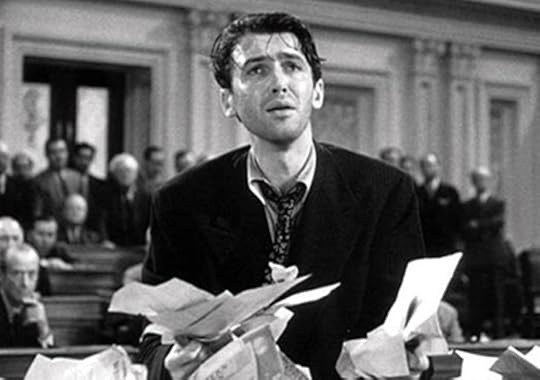 I will give credit where credit is due though. Jean Arthur as Clarissa Saunders was wonderful as the sassy but ultimately helpful secretary to Mr. Smith. Ironically, of the three Oscar nominations for acting that the film received she was not among the honored. But despite her great performance her character does have a major flaw — she falls for the idiotic Mr. Smith even though his naiveté about politics (and life for that matter) is obvious. She’s be better off marrying the unattractive but intellectually equal Diz Moore. This film was all wrong.
I will give credit where credit is due though. Jean Arthur as Clarissa Saunders was wonderful as the sassy but ultimately helpful secretary to Mr. Smith. Ironically, of the three Oscar nominations for acting that the film received she was not among the honored. But despite her great performance her character does have a major flaw — she falls for the idiotic Mr. Smith even though his naiveté about politics (and life for that matter) is obvious. She’s be better off marrying the unattractive but intellectually equal Diz Moore. This film was all wrong.
I would like to say there was at least one memorable line wrapped up in Mr. Smith’s long-winded diatribe in congress:
“Just get up off the ground, that’s all I ask. Get up there with that lady that’s up on top of this Capitol dome, that lady that stands for liberty. Take a look at this country through her eyes if you really want to see something. And you won’t just see scenery; you’ll see the whole parade of what Man’s carved out for himself, after centuries of fighting. Fighting for something better than just jungle law, fighting so’s he can stand on his own two feet, free and decent, like he was created, no matter what his race, color, or creed. That’s what you’d see. There’s no place out there for graft, or greed, or lies, or compromise with human liberties. And, uh, if that’s what the grownups have done with this world that was given to them, then we’d better get those boys’ camps started fast and see what the kids can do. And it’s not too late, because this country is bigger than the Taylors, or you, or me, or anything else. Great principles don’t get lost once they come to light. They’re right here; you just have to see them again!”
That’s a nice bit of writing, but it’s alone in an otherwise dull script. And of course the sentiment is as true today as it was in 1939, and probably 1839 and 1776 as well. Guess I’m a pessimist, but the more things change the more they stay the same, especially when it comes to politics.
I’ve said this before and I’ll say it again — so many films you think you love from their reputation just don’t hold up when you see them again with a critical eye. Just because something is old does not make it classic.
Next on the list: To Kill a Mockingbird
Filed under: AFI Top 100


February 2, 2013
AFI #27: High Noon
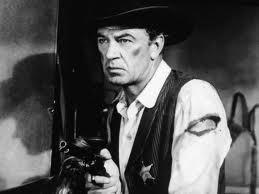 This afternoon I screened High Noon, a film I had never seen before but that I suspected was one of the greatest westerns of all time based on reputation and its high ranking on the AFI list. Boy was I surprised. It’s not a western in the tradition of True Grit, 3:10 to Yuma or Butch Cassidy, but rather it’s a story about one man’s commitment to doing what he thinks is right despite what everyone else thinks and the fact that it takes place in the West is fairly irrelevant. I have to admit that I didn’t really care much for the film, but I was intrigued enough about why it was so critically acclaimed that I had to do some research and I found out some interesting things that changed my opinion — slightly.
This afternoon I screened High Noon, a film I had never seen before but that I suspected was one of the greatest westerns of all time based on reputation and its high ranking on the AFI list. Boy was I surprised. It’s not a western in the tradition of True Grit, 3:10 to Yuma or Butch Cassidy, but rather it’s a story about one man’s commitment to doing what he thinks is right despite what everyone else thinks and the fact that it takes place in the West is fairly irrelevant. I have to admit that I didn’t really care much for the film, but I was intrigued enough about why it was so critically acclaimed that I had to do some research and I found out some interesting things that changed my opinion — slightly.
To begin, the film was made during the height of the red scare and the House Un-American Activities Committee (HUAC) and the film’s writer, Carl Foreman, was a former Communist and when he was called before HUAC he would not name names and was blacklisted. It is said that High Noon is about standing up for what is right even when everyone else does nothing, which is exactly what happens in the film when nobody in the town is willing to help Marshal Kane (Gary Cooper) even though he was responsible for cleaning up the town in the first place. Kane’s new wife, a quaker, initially leaves her new husband because he wouldn’t run away but then goes against her religion and helps her husband, even killing one of the bad guys. Is this Foreman making a statement about religion? 
What makes the film even more interesting to me is that John Wayne hated it. In fact, he said it was the most un-American film ever made. Considering Wayne was a racist and someone who agreed with what HUAC was doing I guess that makes me a fan of High Noon. Lord knows I love a good liberal cause! Strangely, the film is listed as a favorite by both Bill Clinton and Dwight Eisenhower.
High Noon was nominated for Best Picture but did not win. Cooper won for Best Actor, though in my mind he didn’t really do much so it must have been a bad year for actors!
Next: Mr. Smith Goes to Washington
Filed under: AFI Top 100


January 20, 2013
AFI #28: All About Eve
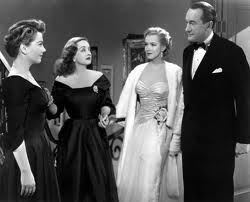 I really enjoyed All About Eve, the 1950 drama featuring Bette Davis. I’d never seen the film, or any Bette Davis film for that matter, and it’s easy to see why the film won so many awards and why Bette Davis is so lauded. The film tells the story of Eve Harrington, a young aspiring actress who weaves her way into the inner lives of her idol Margot Channing (played by Davis). Eve initially seems to be benevolent and simply starry-eyed, but over time we learn she is conniving and ambitious to a fault and that it was no accident that she forced her way into the lives of Channing and the other Broadway insiders.
I really enjoyed All About Eve, the 1950 drama featuring Bette Davis. I’d never seen the film, or any Bette Davis film for that matter, and it’s easy to see why the film won so many awards and why Bette Davis is so lauded. The film tells the story of Eve Harrington, a young aspiring actress who weaves her way into the inner lives of her idol Margot Channing (played by Davis). Eve initially seems to be benevolent and simply starry-eyed, but over time we learn she is conniving and ambitious to a fault and that it was no accident that she forced her way into the lives of Channing and the other Broadway insiders.
All About Eve won the Academy Award for Best Picture in 1951 and it was well deserved. The story is about fame, ambition, jealousy and the nature of people. And while the film is “all about Eve” it’s really just as much about Channing, who is trying to find her way as an “older” actress now that she has hit the big 4-0. Channing is struggling with aging in a young woman’s world, and even worries that her younger boyfriend will leave her for a new model. But as the film moves on and she begins to see the “real” Eve she learns that she has true friendships and the love of her boyfriend and that no matter what Eve does she will always have that. After seeing the film I can’t believe Davis didn’t win the Best ACtress honor, but it’s quite possible the votes were split between her and Anne Baxter who played Eve thus handing the Oscar to Judy Holliday in Born Yesterday.
The film is loaded with tremendous acting performances from Davis and Baxter to George Sanders who won an Oscar for Best Supporting Actor as well as Celeste Holm and Thelma Ritter who were both nominated for Best Supporting Actress. The film even includes Marilyn Monroe in one of her earlier roles. The acting was brilliant in large part because of a wonderful screenplay by Joseph L. Mankiewicz who also directed the film. The dialogue is really excellent and quite provocative for its time. It’s very intelligently written with lots of humor as well. And it has the famous line from Bette Davis:
“Fasten your seatbelt, it’s going to be a bumpy night!”
Next Up: High Noon
Filed under: AFI Top 100


January 18, 2013
AFI #29: Double Indemnity
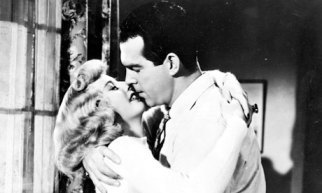 Well, after a month off I’m back to the countdown and No. 29 on the AFI list is 1944′s Double Indemnity starring Fred MacMurray and Barbara Stanwyck. It’s the story of an insurance salesman who together with the unhappy wife of one of his clients plots to kill the husband to collect the insurance money. The film, directed by the great Billy Wilder (Some Like it Hot, The Apartment, Sunset Boulevard), this film tried too hard to be a Raymond Chandler novel (Chandler wrote the screenplay from a novel by James Cain). It’s noir, but for me it is bad noir — I even laughed a few times at the faux drama. I know it was 1944, but there are so many great noir films from that period that this one pales in comparison.
Well, after a month off I’m back to the countdown and No. 29 on the AFI list is 1944′s Double Indemnity starring Fred MacMurray and Barbara Stanwyck. It’s the story of an insurance salesman who together with the unhappy wife of one of his clients plots to kill the husband to collect the insurance money. The film, directed by the great Billy Wilder (Some Like it Hot, The Apartment, Sunset Boulevard), this film tried too hard to be a Raymond Chandler novel (Chandler wrote the screenplay from a novel by James Cain). It’s noir, but for me it is bad noir — I even laughed a few times at the faux drama. I know it was 1944, but there are so many great noir films from that period that this one pales in comparison.
Double Indemnity did get nominated for Best Picture, probably because it was a crappy year for films (Bing Crosby’s Going My Way won the honor). Stanwyck was nominated for Best Actress (she also lost) and in fact the film lost all seven of the Oscars for which it was nominated. I found Stanwyck to be quite good as the icy cool murderous wife and Edward G. Robinson was great as the insurance agency’s skeptical leader. And then there was MacMurray. I was really impressed with his performance in another AFI film, The Apartment, but he was clunky and over-the-top in this performance. I know it is interesting to see the dad from Father Knows Best and the Absent Minded Professor as a killer, but it wasn’t enough for me to say this was a great performance.
I’m going to chalk this one up to AFI voters who think Billy Wilder can do know wrong (he certainly is one of our greatest directors) but this is not one of his best. Overrated!
Next Up: All About Eve
Filed under: AFI Top 100


December 12, 2012
Len’s Top 10 Albums of 2012
Time once again for my annual review of the top albums of 2012 according to me. No apologies here…these are not the “best” albums of the year, simply my favorite:
Babel — Mumford and Sons – They may have gotten a bit overexposed this year, but when you release an album as great as Babel the attention is well deserved. No other album got as much airplay on my Spotify account this year and I still find myself putting it on even as background when I’m reading or doing other things. Such a great album. Thank you Mumfords!
Blak and Blu — Gary Clark, Jr. – After Clark’s EP last year I couldn’t wait for his first full-length album and it didn’t disappoint. He’s a genuine guitar god with a hint of R&B and I always turn it up and melt into the riffs. Best debut album in years.
My Head is an Animal — Of Monsters and Men – It seems every year a single song sneaks up on me and catches my attention and this year I couldn’t get enough of “Mountain Sound” by Iceland’s Of Monsters and Men. And guess what? When the album was released in the U.S. in April the whole damn thing was great! Any band that incorporates a glockenspiel is all right by me. These guys are definitely taking advantage of the indie-folk resurgence and as you can see from my top 10 this year I’m all in.
The Lion The Beast The Beat — Grace Potter & the Nocturnals – A solid follow up to 2010’s eponymous effort, which was my favorite album of that year. Grace has a rock and roll voice beyond comparison and her band can bring it. And it sure doesn’t hurt that she’s gorgeous!
Brilliant – Ultravox – Yes, that’s right…Ultravox! Reformed after nearly 20 years, Midge Ure and company released Brilliant in 2012 and it was…well…brilliant! It’s hard to recapture the same sound after so long, but Midge’s voice is as great as ever and Brilliant could easily have been recorded in 1984. Love it.
Sunken Condos — Donald Fagen – For his fourth solo album Donald Fagen dances with the date that brung him and the result is classic Fagen. If you don’t like Donald Fagen you don’t like music. Sunken Condos is nine jazz-infused pop gems.
The Hunger Games: Songs from District 12 and Beyond – It’s pretty rare for a movie soundtrack to get much airtime in my rotation but when this soundtrack came out I couldn’t get enough. Great songs from The Decemberists, Arcade Fire, Neko Case, The Civil Wars and Glen Hansard. And yes, two excellent tracks from Taylor Swift, whom I had no interest in prior to this but I love both of her songs on this record.
The Sound of the Life of the Mind — Ben Folds Five – I’ll admit this “reunion” album is not as good as the old BFF or even Ben’s solo work, but it’s BFF and that’s good enough for me. There are some great tunes here including the title track and my favorite – Do It Anyway.
Blunderbuss — Jack White – I’ve always been sort of luke warm on Jack White, but for some reason the songs from this album, starting with Love Interruption, hit me over the head like a ton of bricks. Shakin’ brought it home and it’s easily one of my favorite albums of the year.
Halcyon — Ellie Goulding – By all accounts I shouldn’t like Ellie Goulding because frankly I’m not much into “dance” music and I am definitely not a fan of dub step or anything those weird deejays like Skrillex and DeadMau5 play. But from the first time I heard last year’s “Lights” I was hooked and Halcyon is a lovely mix of musical goodness, topped off by Ellie’s unique voice. Still not sure why she’s dating Skrillex though!
Honorable Mentions: Smilers — Aimee Mann; Little Broken Hearts — Norah Jones; Port of Morrow — The Shins; The Only Place — Best Coast; Synthetica – Metric; The Idler Wheel — Fiona Apple; Gossamer — Passion Pit.
Filed under: Music


December 5, 2012
AFI #30: Apocalypse Now
“This is the end…this is the end, my friend.” — Jim Morrison
We’re really getting into this countdown now as we crack into the top 30 films of all time according to AFI. I suppose I may have some disagreements with AFI as we get closer to the top, but this is not one of them. Apocalypse Now is an amazing film that holds up well today even after 33 years. It is one of my favorites and it consistently ranks among the top films ever on nearly every significant countdown.
Apocalypse Now is the story of Captain Benjamin Willard, played by Martin Sheen, who is sent up the river in Vietnam to track down and “terminate” Colonel Walter E. Kurtz, played by Marlon Brando. Kurtz has gone insane and has created a cult of sorts and has taken the war into his own hands. The journey up river into Cambodia is dangerous and deadly but the trip itself helps set the mood for what Willard finds when he gets to Kurtz’ compound. The film, loosely based on the novella Heart of Darkness by Joseph Conrad, was directed by Francis Ford Coppola.
I suppose one could prattle on here about the major themes of the film such as the nature of war, the inner darkness of man, right and wrong, the Vietnam War itself, etc. I’ll pass on that and just say that the film is full things worth pondering. For me it’s mostly memorable for its incredible cinematography and a handful of scenes that are truly some of the most memorable ever shot.
My favorite scene takes place as Willard enlists the help of Lieutenant Colonel Bill Kilgore to clear a path for their boat to head up river. Played by Robert Duvall, Kilgore and his team storm into a village at the base of the river blaring Wagner from their helicopters and blowing the village to kingdom come…and then of course they go surfing. Duvall delivers two classic lines in this scene — “I love the smell of napalm in the morning” and “If I say it’s safe to surf this beach it’s safe to surf this beach!” I can watch this scene a million times and it always makes me smile. Bombs are going off in all directions and Duvall never flinches while his troops are diving for cover.
The images of “Vietnam” are beautiful and the battle scenes are marvelously shot. The places the gang runs into up river are like something out of a science fiction film, none more otherworldly than Kurtz’ compound with dead bodies strewn all over and native ritual dances taking place. Awe inspiring stuff.
There are several other memorable performances in the film — Lawrence Fishburne as Clean, Dennis Hopper as a crazy photojournalist who has fallen under Kurtz’ spell, of course Brando and Sheen were brilliant. Even Harrison Ford and Scott Glenn have small roles early in their careers.
Apocalypse Now won a lot of critical acclaim but it did not clean up at the Academy Awards, winning only for sound and cinematography. Only Duvall was nominated for acting (Sheen was robbed) and Coppola did get nominated for best director, losing to Robert Benton for Kramer vs Kramer which also won best picture that year. It was a good year for films, and Apocalypse Now was nominated for best picture along with All That Jazz, Breaking Away and Norma Rae. Being There was also from 1979 and it didn’t even get nominated! Still, for my money Apocalypse Now should have won.
Next up: Double Indemnity
Filed under: AFI Top 100




